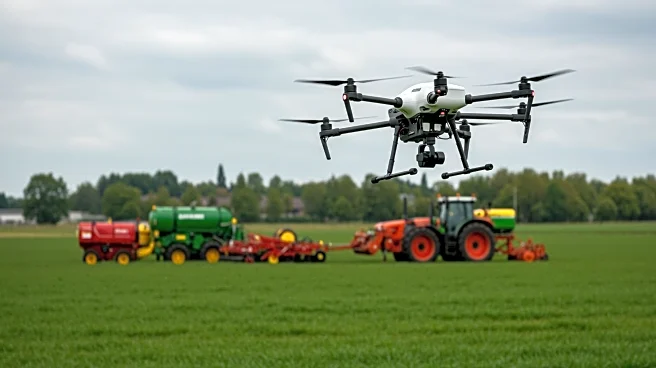What's Happening?
Precision agriculture technologies are transforming waste management in the agricultural sector by utilizing satellite imagery, drones, sensors, IoT devices, and AI platforms. These technologies enable farmers to monitor soil conditions, optimize irrigation, and apply inputs more precisely, leading to increased crop yields and resource savings. The integration of these technologies is reshaping farming practices by enhancing productivity and sustainability. According to the source, precision agriculture can increase yields by 15-25% and reduce resource usage by 25-40%, while also cutting costs by up to 30%. This technological advancement is crucial as the global population grows and climate change challenges intensify, necessitating more efficient and sustainable farming methods.
Why It's Important?
The adoption of precision agriculture technologies is significant for the U.S. agricultural industry as it addresses key challenges such as resource scarcity, environmental impact, and food security. By improving efficiency and reducing waste, these technologies can help farmers meet the increasing demand for food while minimizing their ecological footprint. The potential cost savings and yield improvements offer economic benefits to farmers, enhancing their competitiveness in the global market. Additionally, the environmental benefits, such as reduced runoff and contamination, contribute to better stewardship of natural resources, aligning with broader sustainability goals.
What's Next?
As precision agriculture technologies continue to evolve, their adoption is expected to increase among U.S. farmers. This could lead to further advancements in data-driven farming practices, potentially integrating more sophisticated AI analytics and IoT solutions. Stakeholders, including policymakers and agricultural businesses, may focus on supporting the infrastructure and training necessary for widespread implementation. The ongoing development of these technologies could also prompt discussions on regulatory frameworks to ensure ethical and sustainable use.
Beyond the Headlines
The integration of precision agriculture technologies may have deeper implications for rural communities and the agricultural workforce. Automation and data-driven practices could alter traditional farming roles, necessitating new skills and potentially reducing labor demand. This shift might require educational initiatives to prepare the workforce for technology-driven agriculture. Additionally, the ethical considerations of data privacy and ownership in farming could become more prominent as these technologies become more pervasive.









